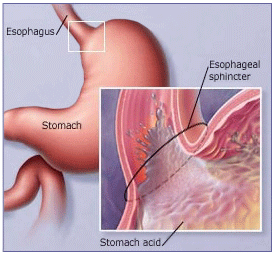
The Most Common Symptoms of Gastrix RefluxGastric reflux is another term for Pyrosis or what is commonly known as heartburn. It is usually described as a painful and burning feeling in the stomach, spreading throughout the chest, and radiating towards the neck and the throat. Every time we eat, the food passes through the esophagus and reaches the stomach where it is digested.
This acid mixes with the food and can either be absorbed or increased, depending upon the type of food we eat. If the LES is weak, there is a great possibility of reflux,
which can be caused by pressure within the stomach or the valve’s inability to close
tightly. If you haven’t noticed any change in the intensity of the pain, even after you took medicines and altered your dietary habits, you may be suffering from GERD. The frequency of attacks usually increases up to several times a week and will later have a great impact on your daily activities, sleep, and diet. What are the causes of Gastric Reflux? Gastric reflux is caused by a number of factors including natural occurrences, common health problems and even malnutrition. Among these conditions are pregnancy, asthma and obesity. It can be also brought about by unhealthy lifestyle. Studies proved that smoking and too much alcohol, aside from liver problems, can also cause heartburn. Some foods have properties that may trigger the symptoms like those which are spicy, high in cholesterol, acidic, and rich in caffeine. The scientific explanation is that these foods ruin the ph balance of the stomach and sometimes stimulates production of gastric acids. If you are among those people suffering from heartburn and indigestion, you might want to take a look at the symptoms listed below. These are common symptoms of gastric reflux which should not be taken lightly. If you noticed any of these symptoms occurring, it is advised to consult your doctor for medical help.
As explained before, this condition usually comes with a burning sensation in the chest, neck and throat. If it is becoming recurrent and doesn’t go away even after several hours, it may be symptoms of GERD.
Your mouth starts to taste somewhere between sour and bitter because of the acids which flowed back from the stomach. The acid reaches the throat and the mouth area allowing you to taste it and is accompanied by foul breath.
When the esophagus becomes irritated due to the reflux of gastric acids, swallowing will also be extremely difficult. The track usually gets swollen and the lining gets torn, causing pain when eating. You may experience a hard time keeping the food down, and it will be like some of the foods are stuck in your throat, even after drinking plenty of water. These symptoms may also be related to other diseases such as erosive esophagitis or esophageal cancer, so it is better to tell your doctor about it. Preventing the symptoms of gastric reflux is possible, especially during an early stage. It will only get worse if left unattended and ignored. As always, the key to health is found in the way we live, the right choice of food and in our daily habits. | |||
*Disclaimer: The information found on this website should not be used as a replacement for professional medical care for the diagnosis, prevention, or treatment of reflux. Please consult with your general practioner or pharmacist before attempting to use any medication (prescription or OTC) or following any of the treatment methods mentioned. This information is provided solely to help you become as informed as possible about the acid reflux condition and its symptoms. |
Home About Us Privacy Contact Us Site Map
© Copyright www.acidrefluxsymptomsnow.com , 2010. All Rights Reserved.
Content Network: asbestos compensation | lower back pain relief
 The stomach and esophagus are connected by what we call as
LES or lower esophageal sphincter. This is a valve or a band of muscles
which acts as a barrier to prevent the gastric acids from flowing back into the track. The stomach naturally
produces
The stomach and esophagus are connected by what we call as
LES or lower esophageal sphincter. This is a valve or a band of muscles
which acts as a barrier to prevent the gastric acids from flowing back into the track. The stomach naturally
produces 

